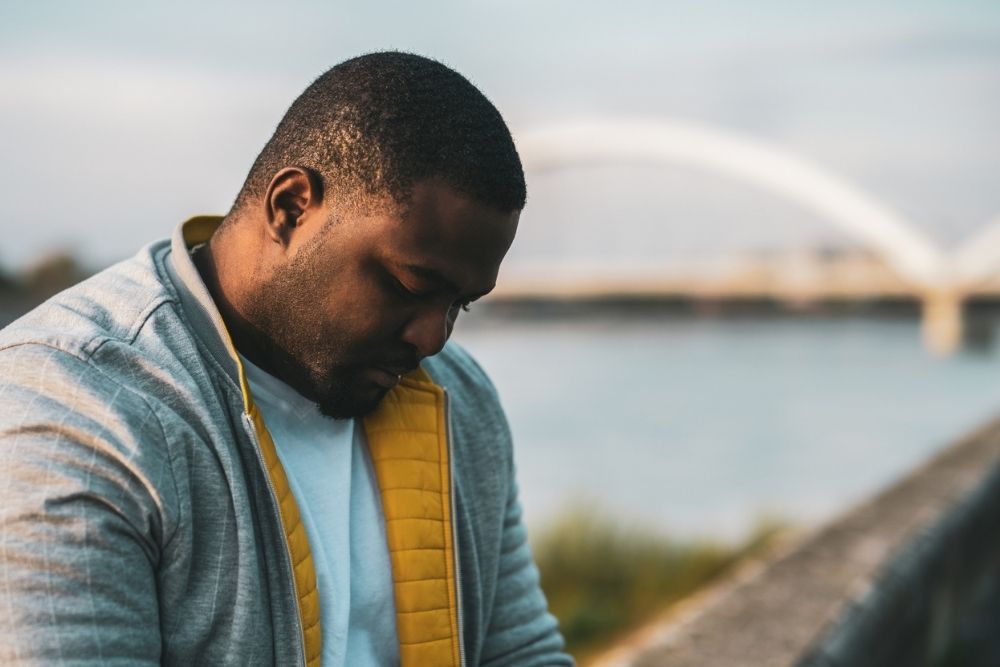Society has long sent a message to men that expressing vulnerability is a sign of failure. Think of the characters we’re used to seeing in action movies—gritty, silent types who power through pain without blinking. Think Sylvester Stallone in Rocky, Bruce Willis in Die Hard, Mel Gibson in Lethal Weapon, or Brad Pitt in Fight Club.
While these portrayals can be entertaining, they can also reinforce ideas that are harmful to a man’s mental health. Real strength isn’t about bottling things up. It’s about facing what’s inside and seeking help when you need it.
Statistically, men are less likely than women to seek therapy or talk about their mental health. The Centers for Disease Control and Prevention (CDC) reports that men die by suicide nearly four times more often than women—even though they are diagnosed with depression at lower rates. This gap stems not from an absence of pain, but from an absence of permission to talk about it.
Common Myths That Keep Men Silent
The stigma surrounding men’s mental health is reinforced by myths that keep many men stuck in silence—afraid to seek help, afraid to feel, and afraid to be seen as anything other than “tough.” Let’s break down the most damaging myths and reveal the truth behind them.
Myth #1: “Real Men Don’t Cry.”
This idea teaches boys from a young age that emotions are signs of weakness. Crying is portrayed as something shameful, rather than a healthy release. But emotions don’t discriminate. They’re not masculine or feminine. They’re just human.
Even public figures who embody physical and emotional strength have cried openly. For example, NFL player Terry Bradshaw has talked about his battle with depression and the importance of letting go emotionally. Allowing yourself to feel is a sign of strength, not weakness. It’s a step toward healing, not a failure to “man up.”
Myth #2: “Talking About Your Feelings Is Whining.”
There’s a world of difference between acknowledging pain and dwelling in self-pity. Talking about your feelings is how you begin to process them. It’s how you develop insight, build coping skills, and prevent emotions from turning into destructive behaviors like violence towards others or substance use.
Mental health issues are medical in nature—not moral failings or character flaws. You wouldn’t ignore a broken leg or shame someone for having asthma. So why minimize anxiety, depression, or PTSD?
Myth #3: “If I Open up, People Will Think Less of Me.”
This fear is rooted in shame and isolation. Men often worry they’ll be perceived as weak, unreliable, or incapable if they admit to anxiety, depression, or other mental health conditions. But studies show the opposite—vulnerability fosters trust, deepens relationships, and often earns respect.
In fact, public figures who share their mental health stories, like Olympic gold medalist Michael Phelps or actor Ryan Reynolds, are praised for their honesty. They’ve shown that you can be a successful professional and still need support.
Myth #4: “I Should Be Able to Handle This on My Own.”
The pressure to be completely self-sufficient is overwhelming—and it’s a standard no one can meet. Everyone needs support. Asking for help doesn’t mean you’ve failed. It means you’re brave enough to do something about your pain.
The truth is, ignoring mental health issues doesn’t make them go away—it makes them worse. And pretending everything’s fine only delays healing.
Myth #5: “Therapy Is for People Who Are Broken.”
Therapy is not a last resort—it’s a proactive step toward understanding yourself and improving your life. You don’t have to be in crisis to benefit from therapy. Just as people go to the gym to stay physically healthy, therapy helps you stay mentally healthy.
It can be helpful to reframe the therapy experience as coaching, skill-building, or problem-solving. It’s not about being “fixed”—it’s about accessing the resources and support you need to grow stronger and live with more clarity and purpose.
Simple Ways to Start the Conversation
Open, honest communication is the first step towards better mental health.
If you’re a man dealing with mental health challenges:
- Reach out to someone you trust. You don’t have to begin with a therapist or a support group. Talk to a friend, sibling, or partner—anyone who makes you feel comfortable.
- Use casual language. If saying “I’m struggling” feels too difficult, try something simpler like “Lately, I haven’t been feeling like myself.”
- Write it down. Getting your thoughts on paper can help you clarify what you’re feeling and make it easier to talk about.
- Start small. You don’t have to share everything all at once. Start with what feels manageable and go from there.
- Seek professional help. A therapist can provide tools to help you feel more in control. Cognitive behavioral therapy (CBT) and dialectical behavioral therapy (DBT) are two common approaches that are both action-oriented and solution-focused.
If you’re worried about a man in your life who seems to be struggling with his mental health:
- Be present, not pushy. Let them know you’re there whenever they’re ready to talk, without forcing the issue.
- Listen without trying to fix anything. Often, men are afraid that sharing their feelings will lead to judgment or solutions they didn’t ask for. Sometimes, they just want to be heard.
- Validate their experience. Say things like, “That sounds really hard,” or “I’m glad you told me.”
- Celebrate small wins. If they open up to you, even a little, recognize the courage that took. Changing old ways of thinking is an ongoing process—and they’ve trusted you to be a part of their journey.
- Encourage professional support. Suggest therapy in a non-threatening way—such as saying, “When I was struggling, talking to someone helped me a lot,” or “You don’t have to go through this alone—there are people trained to help.”
You Don’t Have to Do This Alone
Life is hard, and pretending you’re okay doesn’t make it easier. What does help is reaching out.
At Eagle View Behavioral Health, we’re here with compassionate, judgment-free support tailored to your unique needs. Contact us today for a free, confidential assessment or to learn more about the programs we offer at our Bettendorf, Iowa, facility.






